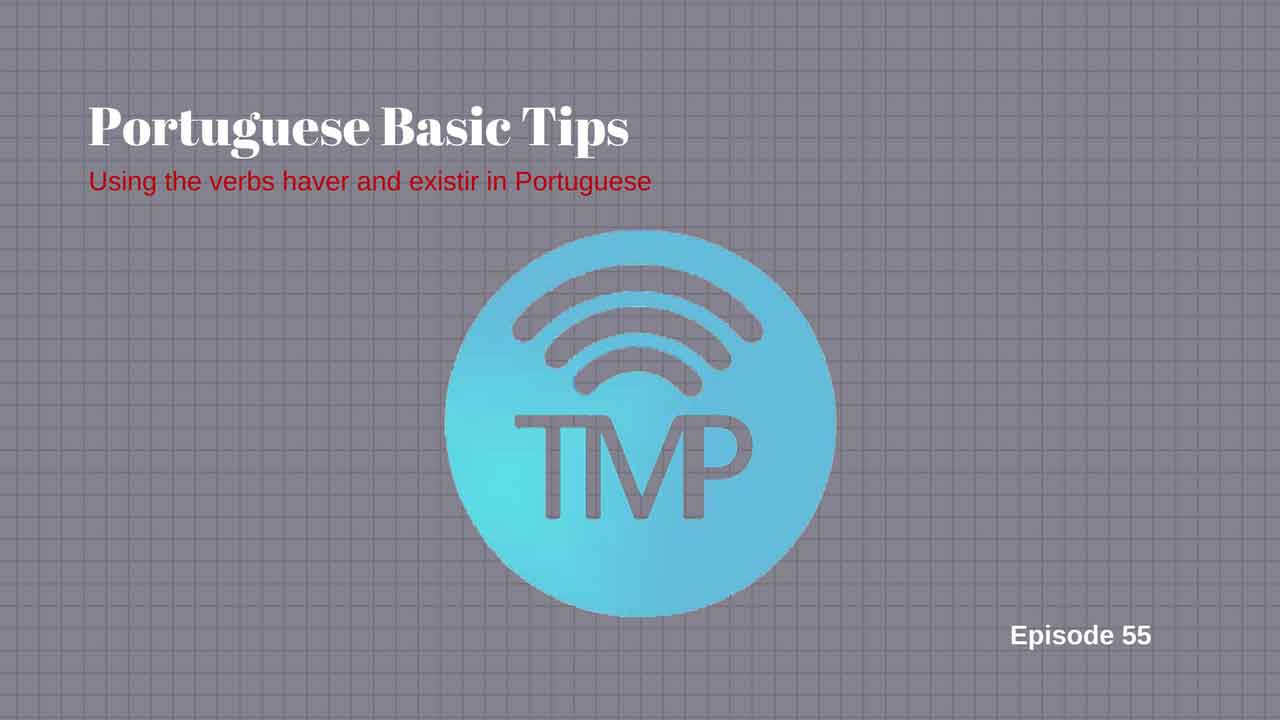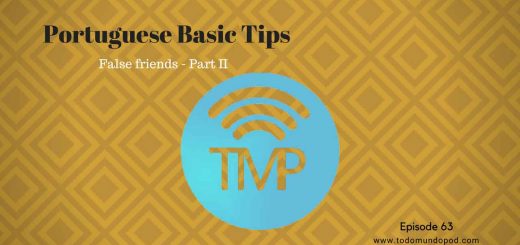Using the verbs haver and existir in Portuguese

Using the verbs haver and existir in Portuguese – Episode 55
Hello there and welcome to our Portuguese Basic Tips 55 (in English) called using the verbs haver and existir in Portuguese
On today’s podcast, we are going to speak about how to use the verbs haver and existir in Portuguese. I have already spoken a lot about the verb haver, especially when we talked about verbs in the subjunctive forms in Portuguese, do you remember that? It turns out that the verb “haver” has a few peculiarities and we should discuss them today.
Click on the link to visit our first episode of the series about subjunctive tense in Portuguese
First, let’s remember how to conjugate the verbs haver and existir in the Portuguese present tense
Haver verb
| Haver verb | Using the haver verb in Portuguese |
| Eu | hei |
| Tu | hás |
| Ele | há |
| Nós | havemos |
| Vós | haveis |
| Eles | hão |
Here, you can notice that we are flexing, we are changing the conjugations according to the person we are referring to.
Now, let’s try to conjugate the verb “existir”. Again, we are doing this in the Portuguese present tense.
Existir verb
| Existir verb | Using existir verb in Portuguese |
| Eu | existo |
| Tu | existes |
| Ele | existe |
| Nós | existimos |
| Vós | existis |
| Eles | existem |
In these conjugations, we are using the two verbs with different meanings. For instance, we could say “eles hão de chegar cedo” meaning “they will come soon” or “they should come soon”. Regarding to “existir” verb, we could say a sentence like “existem muitas pessoas aqui hoje” meaning “there are lots of people here today”.
So what’s the point of this podcast today, Marcos?
The point is that we normally use haver verb with the same meaning of existir verb in Portuguese. How’s that?
Exactly! You could say “há alguém aqui” or “existe alguém aqui” meaning there is someone here.
However, this podcast does not deal exactly with synonymous expressions in Portuguese. What I want you to learn here is that in Portuguese we have some verbs called “verbos impessoais”. That is to say “impersonal verbs”. They are verbs that don’t change when we conjugate them.
For instance:
When we are using the verb “existir” in its plural form, we say:
- Existem muitas pessoas aqui (There are many people here)
Now, pay attention to the same sentence, but this time, we are going to use the verb “haver”.
- Há muitas pessoas aqui. (There are lots of people here)
See that we don’t say something as “hão muitas pessoas aqui”. Even when we are referring to a certain number of people, the conjugation remains in the singular form. To be exact, the conjugation is made with the “Terceira pessoa do singular” (the third person of the singular form).
And when I say that, I mean you’ll always use the verb “haver” (meaning ocorrer or existir) this way, not only in the present tense.
That said, I think we should practice both ways of conjugating these verbs, with lots of examples and various tenses.
Can you come with me?
- Existem muitas pessoas aqui (There are many people here)
Now, try to say the same sentence using the verb “haver”. I’ll wait for you!
Yeah! You’re right!
- Há muitas pessoas aqui! (There are many people here).
Did you remember not to change the verb haver to the plural form? Again, the correct way would be “há muitas pessoas aqui”.
Now, let’s use both verbs in “pretérito perfeito” form.
- Existiram muitos conflitos aqui (There have been many conflicts here)
Now with the verb “haver”. Repeat with me:
- Houve muitos conflitos aqui. (There have been many conflicts here)
Pretérito imperfeito
- Existiam diversas famílias lá. (There were several families there)
- Havia diversas famílias lá. (There were several families there)
Futuro do presente
– Neste ano, existirão muitas oportunidades para nós (This year there will be many opportunities for us)
– Neste ano, haverá muitas oportunidades para nós. (This year there will be many opportunities for us.)
Ok, guys! You see this is not a complicated topic; you just need to be aware of it. Sometimes you’ll hear a Brazilian guy saying something as “haverão conflitos” or “houveram conflitos”. As you are a very polite guy, you don’t need to correct him, but this is an informal way of using the verb “haver” meaning “existir”.
Click on the links below to know the conjugations of haver and existir in Portuguese
Become a Premium Member and download our full transcripts
Ok, guys! I hope this will be usefull!
See you next time.
Thanks
Marcos Sales
Podcast (portuguesebasictips): Play in new window | Download







Recent Comments